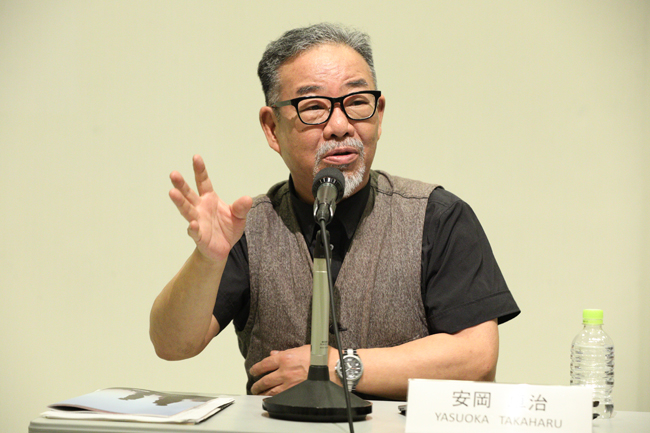Significance of gathering filmmakers of the same generation across the borders
Ikeda: Ms. Fujioka and Mr. Ichiyama talked about filmmakers who have just begun their careers after studying by themselves or at universities. Mr. Yasuoka, on the other hand, supports students at the earlier stage. I would like him to supplement his case and explain about other projects where he is involved.
Takaharu Yasuoka (hereinafter Yasuoka): We've held the forum in China, Taiwan, Korea, and Japan. What I have learned from the forum in these four regions in Asia is differences in cultural landscapes and diversity. The approach to filmmaking differs according to regions and universities. I myself was engaged in independent documentary films for theatrical release. Since both Yunnan Arts University and National Tainan University of the Arts, which participated in the project, regard documentary films as visual anthropology, they have completely different ideas. The films by the lecturers endlessly edit testimonial interviews. A professor of Yong-In University in Korea is an experimental filmmaker who has studied filmmaking in the States and has therefore a completely different stance towards documentary films. When such lecturers with completely different directions face students together, they don't contradict or oppose one another but agree in opinion. This was a happy discovery. We cannot avoid the issue of the history of East Asia, which has been firmly incorporated into discussion, developing awareness of mutual understanding among the lecturers and students. This was a good start for the students.
Recently, the Japan Institute of the Moving Image has had an increasing number of international students. As I see students from China, Korea, Nepal, and other Asian countries discussing Japanese films, I have a great discovery of how they have seen them. The Institute offers many filmmaking lessons. The students deepen their communication through making films together. They occasionally fiercely oppose one another. However, I believe that arguments greatly help them to understand and connect to one another. International students have undergone some change. At the beginning, "You can make little money in Japan", they said, "If you work in China, you can get twice or thrice as much as in Japan". They paid no attention to finding a job in Japan. When I had job interviews with them the other day, they said, "We want to work in Japan". For they can master a rational production system in Japan. These days I am very curious about how they study and go out into Asia.

Ikeda: How do you find "...and Action! Asia: Asia Exchange Program for Students in Film Studies" (hosted by the Japan Foundation Asia Center)?
Yasuoka: It's a very meaningful program. I am very sorry that this ended. In 2015 it was launched. Since then it has continued with the help of the Japan Institute of the Moving Image. I was personally involved in the second workshop program that gathered students from diverse Southeast Asian countries. In this workshop the students were split into multinational groups to work together. When I joined the workshop, the students had to do research, do planning session, and make a presentation during a very limited time period. Since then the workshop has been greatly upgraded to make dramas and documentaries. Some students from my class took part in the workshop. They experienced very profound communication through joint work in mixed groups. They still keep in touch with their team mates across the borders. For example, some have moved into making a film with Vietnamese students. Asia and then the world are connected through Japan as a relay base. I have a good response in the workshop as the bonds between the friends who have made films together are growing.
Shozo Ichiyama (hereinafter Ichiyama): To supplement Mr. Yasuoka's story, the Talents Tokyo (TT) has also some cases in which contemporary participants subsequently have worked together. For example, the heroin of Ilo Ilo (2013) by Anthony Chen (alumnus of TT2010) is a Filipino maid working in Singapore. Since they couldn't find any Filipino actor within Singapore, they asked Sheron Dayoc who is a Filipino director and is also Anthony's contemporary to hold an audition in the Philippines and cast a wonderful actress, Angeli Bayani for the role. Thus, the film was successfully completed. People from many countries participate in the program. When they need help from other countries for their subsequent films, they can count on their fellow participants who volunteer to work without pay. If you have a lot of money, you can of course hire a casting director. Independent filmmakers without funding, however, can make it happen through personal networking. When Filipino director Hannah Espia (alumna of TT2012) shot the airport in Thailand, she also asked her contemporary Thai director to organize filming. These are just an example of many horizontal connections between participants who work together after completing the TT. It is important that people of the same generation and many nationalities gather together. How can Japanese filmmakers enter such a network? This is the point.
Ikeda: You are right. They often get to know each other in a short space of time and form a "resonating" relationship. Talents Tokyo, in its selection process, puts high value as well on applicants' networking skills which may cause chemical reactions to occur by having them participate in the workshop, besides their submitted plans and future prospects.






